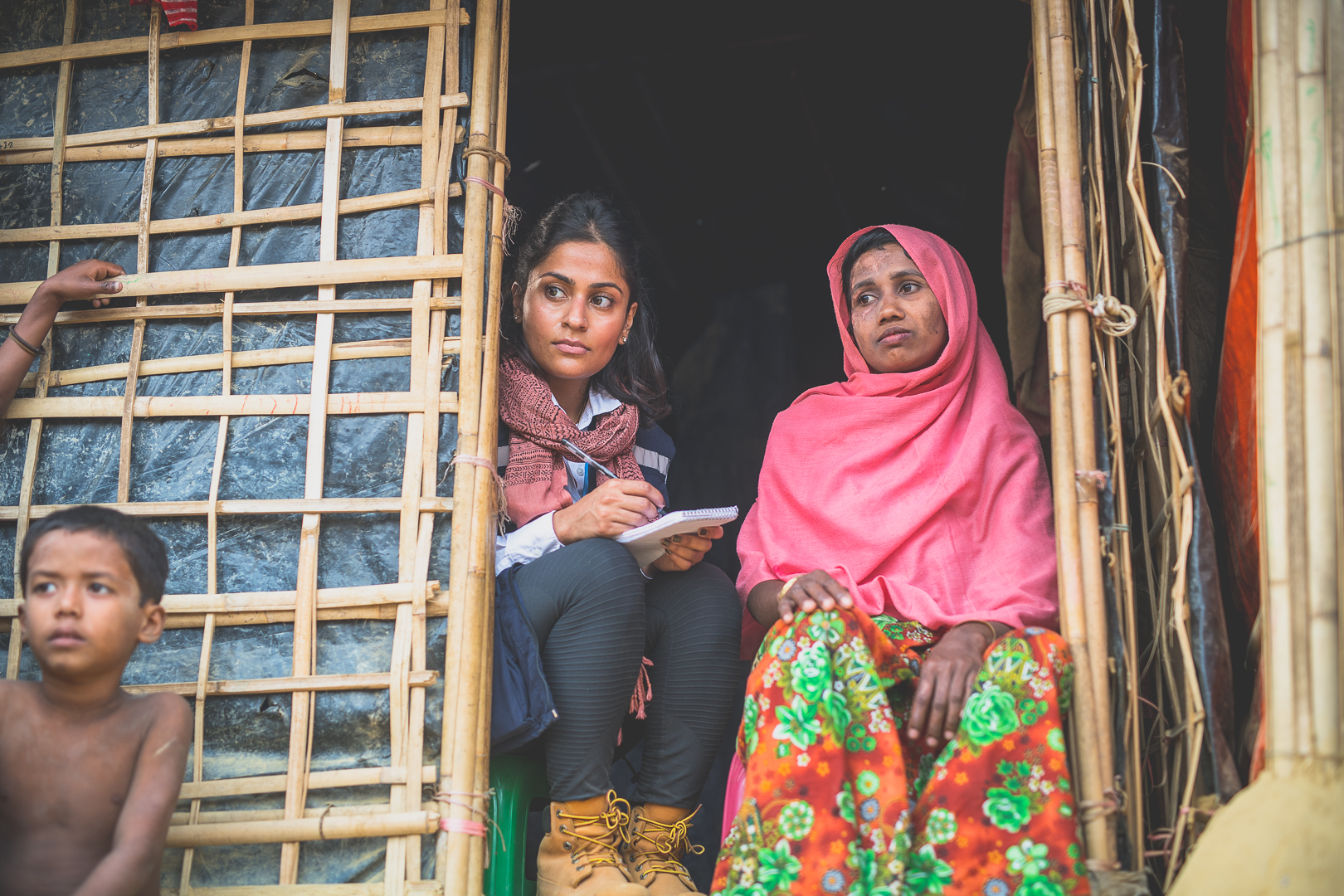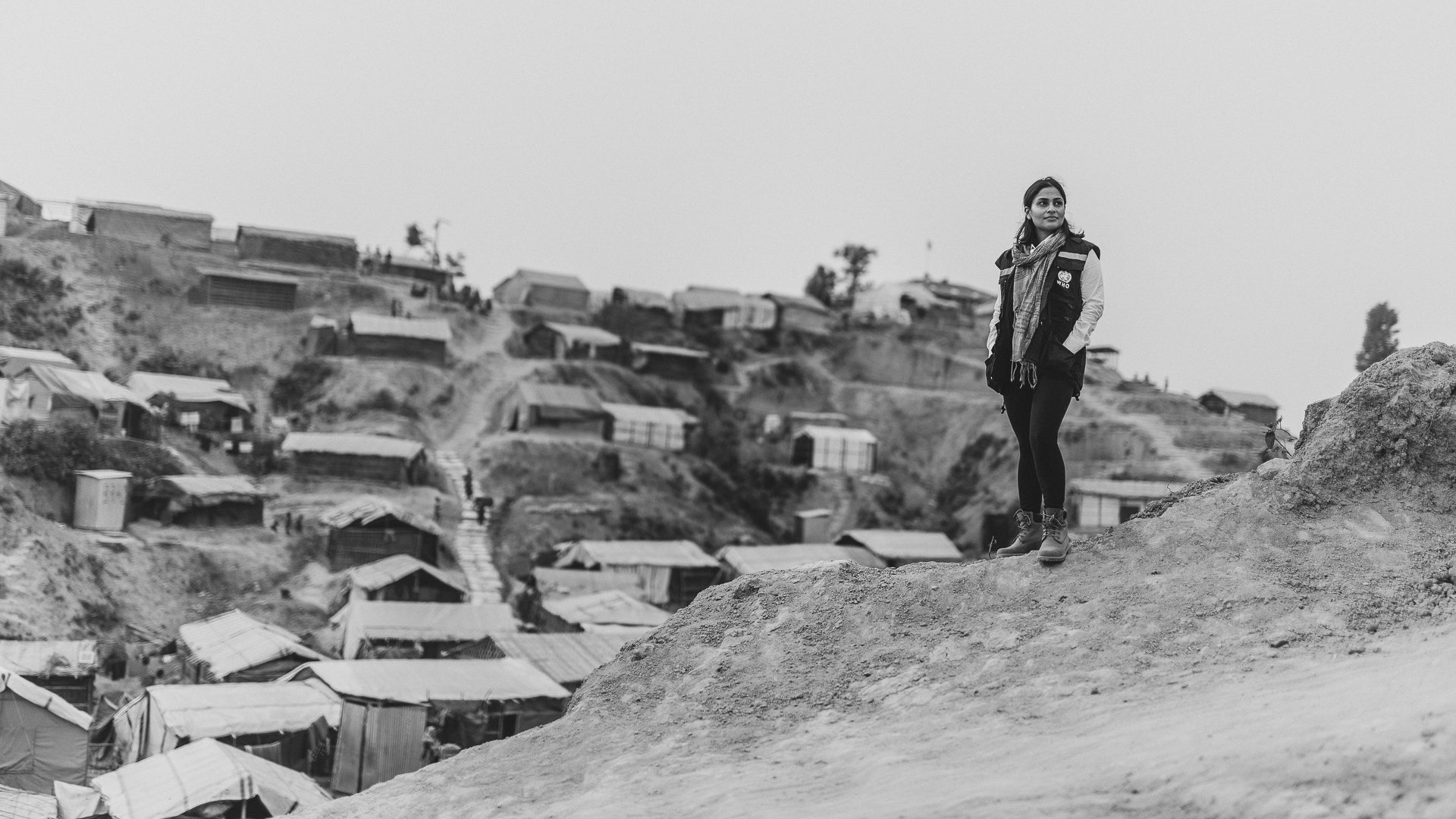Purvi Paliwal, is a Technical Officer, based in WHO’s South-East Asia Regional office in Delhi. On 17 September, she was deployed to Cox’s Bazar, Bangladesh, for the first time to work on the Rohingya crisis after the first wave of refugees started arriving on 25 August 2017.
She has been several times to the makes-shift camps that now host almost 1 million people. “For people who come to the camps for the first time, it looks very disorganized and chaotic. But if I compare this to what I saw in early September, it is more organized now than before. The road through Balukhali in the mega camp site wasn’t there. That has really improved accessibility. People providing medical supplies and relief to the Rohingyas no longer need to walk for hours to reach them.”

In 2017, Purvi worked on other emergencies such as the drought in Ethiopia and floods in Sri Lanka. What was the lesson she learnt during her deployments in Cox’s Bazar? “That the will to survive is the strongest human emotion, that our will to live as human beings is innate. I heard many painful and extremely traumatic stories from Rohingya people that I met in the camps. But their resilience and will to carry on is what I admire.”
She works on resource mobilisation and operational planning and she believes that you really need to know the needs on the ground first. So she is often on the road to the camps. She also understands the importance of supporting the host community. “I think the host community and Bangladesh, both the citizens as well as the government have been very generous in responding and accommodating the Rohingya so far. But we can’t ignore the fact that they have been also affected, and Cox’s Bazar is already a resource limited setting compared to the rest of Bangladesh. So, in a scenario where access to services was already overstretched, when you have an influx of the kind you have seen, obviously the host community is also bearing the brunt of it and we have to be cognizant of their needs and address them to the extent possible.”

On February 10th, she completed her third deployment in Cox’s Bazar. “Personally, I’m going to miss the adrenaline of working in this response. The team here has been amazing. We have worked very hard, but I haven’t felt tired for a single day and it’s been because we all really believe in what we are doing and that it makes a difference and it loses relevance if it is not done immediately. And this is what I am going to miss.”
She has been several times to the makes-shift camps that now host almost 1 million people. “For people who come to the camps for the first time, it looks very disorganized and chaotic. But if I compare this to what I saw in early September, it is more organized now than before. The road through Balukhali in the mega camp site wasn’t there. That has really improved accessibility. People providing medical supplies and relief to the Rohingyas no longer need to walk for hours to reach them.”

In 2017, Purvi worked on other emergencies such as the drought in Ethiopia and floods in Sri Lanka. What was the lesson she learnt during her deployments in Cox’s Bazar? “That the will to survive is the strongest human emotion, that our will to live as human beings is innate. I heard many painful and extremely traumatic stories from Rohingya people that I met in the camps. But their resilience and will to carry on is what I admire.”
She works on resource mobilisation and operational planning and she believes that you really need to know the needs on the ground first. So she is often on the road to the camps. She also understands the importance of supporting the host community. “I think the host community and Bangladesh, both the citizens as well as the government have been very generous in responding and accommodating the Rohingya so far. But we can’t ignore the fact that they have been also affected, and Cox’s Bazar is already a resource limited setting compared to the rest of Bangladesh. So, in a scenario where access to services was already overstretched, when you have an influx of the kind you have seen, obviously the host community is also bearing the brunt of it and we have to be cognizant of their needs and address them to the extent possible.”

On February 10th, she completed her third deployment in Cox’s Bazar. “Personally, I’m going to miss the adrenaline of working in this response. The team here has been amazing. We have worked very hard, but I haven’t felt tired for a single day and it’s been because we all really believe in what we are doing and that it makes a difference and it loses relevance if it is not done immediately. And this is what I am going to miss.”
